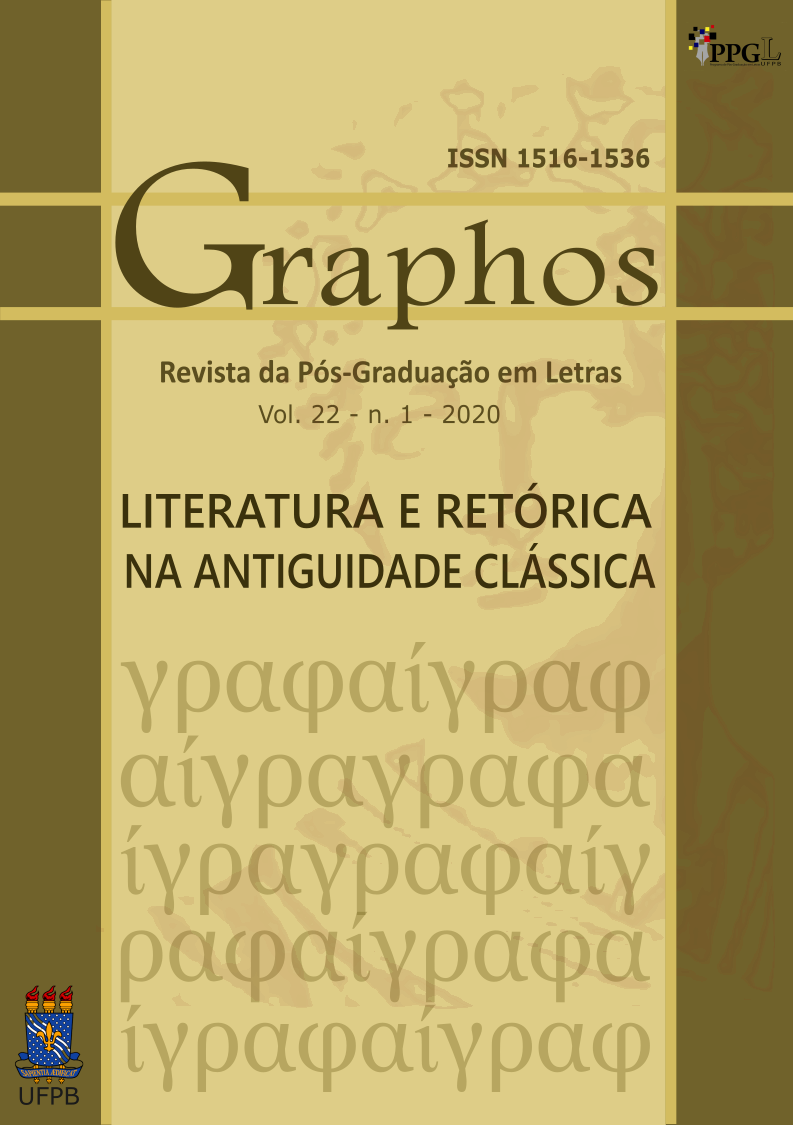Livy and the characterization of the gaul as the enemy in the Ab vrbe condita (vii, 9-10, 26; xxxviii, 17)
Keywords:
Livy, Gaul, Enemy, Characterization, InferiorityAbstract
Livy, contemporary of Augustus, has written a monumental work entitled Ab Vrbe condita. The text described annually the events of Rome since its mythical foundation until the days of the author. As a fundamental part of the history of the Vrbs’ consolidation, there is a description of numerous confronts and wars between Romans and their enemies. In the archaic period of Rome (approached in the first decade of the Ab Vrbe condita), the Gauls were highlighted as the great opponents of the city – especially in the events that led to the sack of Rome around 390 B.C. It is known that Livy has written his historical work with nationalist purposes, and many times he stressed Romans’ superiority above foreign nations. Livy assigned the supremacy of Rome to its divine and elevated origins, and he has used that argument to justify the Romans’ domain over other people. At the beginning of this paper, there is a discussion about the sources employed by Livy in his work, as well as the role of Cicero’s influence on the writing of the Ab Vrbe condita. Besides, there is the selection of some specific parts (VII, 9-10, 26 e XXXVIII, 17), that will be approached in-depth, to observe how Livy has constructed the Gauls’ image as enemies of Rome. For that purpose, there is an analysis about the stereotypes, words and clichés employed by Livy, and how he has manipulated these elements in order not only to describe the Gauls as enemies, but also as inferior to the Romans.
Downloads
References
ARISTÓTELES. Política. Introducción, traducción y notas de Manuela García Valdés. Madrid: Gredos, 1988.
_____________. Retórica. Introducción, traducción y notas por Quintín Racionero. Madrid: Gredos, 1994.
CICÉRON, M. T. L’orateur, et du meilleur genre d’orateurs. Texte établi et traduit par Albert Yon. Paris: Les Belles Lettres, 1964.
HIPÓCRATES. Ares, Águas e Lugares. In: CAIRUS, Henrique F.; RIBEIRO JR., Wilson A. Textos hipocráticos: o doente, o médico e a doença. Rio de Janeiro: Fiocruz, 2005, p. 91-129.
TITE LIVE. Histoire romaine: livre VII. Texte établi par Jean Bayet et traduit par Raymond Bloch. Paris: Les Belles Lettres, 1968, tome VII.
_________. Histoire romaine: livre XXXVIII. Texte établi et traduit par Richard Adam. Paris: Les Belles Lettres, 1982, tome XXVIII.
Estudos
ANDRÉ, Jean-Marie; HUS, Alain. L’Histoire à Rome: historiens et biographes dans la littérature latine. [s.l.]: Presses Universitaires de France, 1974.
BECK, Hans. The early Roman tradition. In: MARINCOLA, John (ed.). A companion to Greek and Roman historiography. Oxford: Blackwell Companions to the Ancient World, 2007, v. 1, p. 259-265.
BORCA, Federico. Luoghi, corpi, costumi: determinismo ambientale ed etnografia antica. Roma: Edizione di Storia e Letteratura, 2003.
BRISCOE, John. A commentary on Livy: books 38-40. Oxford: Oxford University Press, 2008.
BROWN, A. Civilized Gaul: Caesar’s portrait of Piso Aquitanus (De bello Gallico 4.12.4-6). Mnemosyne: a journal of Classical Studies, Amsterdam, v. 67, f. 3, p. 391-404, 2014.
CHAPLIN, Jane D. Livy’s exemplary history. Oxford: Oxford University Press, 2000.
CONTE, Gian Biagio. Latin Literature: a history. Trad. Joseph B. Solodow. Baltimore:
Johns Hopkins University Press, 1999.
DAUGE, Y.A. Le barbare, recherches sur la conception romaine de la barbarie et de la civilisation. Bruxelles: Éditions Latomus, 1981.
FORNARA, Charles. The nature of history in ancient Greece and Rome. University of California Press, 1983.
GIROD, M. R. La géographie de Tite-Live. In: HAASE, Wolfgang (ed.). Aufstieg und Niedergang der Römischen Welt (ANRW). Berlin: Walter de Gruyter, 1982, band II, 30.2, p. 1190-1229.
GRUEN, Erich S. Greeks and non-Greeks. In: BUGH, Glenn R. (ed.). The Cambridge Companion to the Hellenistic world. Cambridge: Cambridge University Press, 2006, p. 295-314.
FORSYTHE, Gary. A critical history of early Rome: from prehistory to the first Punic War. Berkeley: University of California Press, 2005.
FUNARI, Pedro Paulo A.; GARRAFFONI, Renata Senna. Historiografia: Salústio, Tito Lívio e Tácito. Campinas: Editora Unicamp, 2016.
LINTOTT, Andrew W. Roman historians. In: BOARDMAN, John; GRIFFIN, Jasper; MURRAY, Oswyn (eds.). The Oxford History of the Classical World. Oxford: Oxford University Press, 1986, p. 529-539.
LUCE, T. J. Livy: the composition of his history. Princeton: Princeton University Press, 1977.
MARTIN, René; GAILLARD, Jacques. Les genres littéraires à Rome. Paris: Nathan/ Scodel, 1981.
MARTINS, Paulo. Literatura latina. Curitiba: IESDE Brasil, 2009.
OAKLEY, Stephen P. A commentary on Livy: books VI-X. Oxford: Claredon Press, 1998, v.II.
OGILVIE, R. M. A commentary on Livy: books 1-5. Oxford: Claredon Press, 1965.
OLIVER, Graham J. History and rhetoric. In: BUGH, Glenn R. (ed.). The Cambridge Companion to the Hellenistic world. Cambridge: Cambridge University Press, 2006, p. 113-135.
PEREIRA, Maria Helena da Rocha. Estudos de história da cultura clássica. 7. ed. Lisboa: Fundação Calouste Gulbenkian, 1993, v.2.
PHILLIPS, Jane E. Current research in Livy`s first decade: 1959-1979. In: HAASE, Wolfgang (ed.). Aufstieg und Niedergang der Römischen Welt (ANRW). Berlin: Walter de Gruyter, 1982, band II, 30.2, p. 998-1051.
RANKIN, David. Celts and the classical world. London: Routledge, 1996.
RIGGSBY, Andrew. M. Caesar in Gaul and Rome: war in words. Austin: University of Texas Press, 2006.
SEBASTIANI, Breno. A política como objeto de estudo: Tito Lívio e o pensamento historiográfico romano do século I a.C. In: JOLY, Fábio Duarte (org.). História e retórica: ensaios sobre historiografia antiga. São Paulo: Alameda, 2007, p. 77-96.
SHERWIN-WHITE, Adrian N. Racial prejudice in imperial Rome. Cambridge: Cambridge University Press, 1967.
TRINGALI, Dante. Introdução à retórica. São Paulo: Duas Cidades, 1988.







